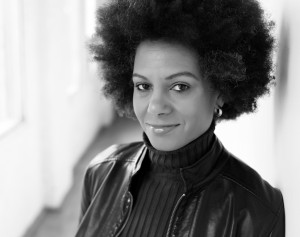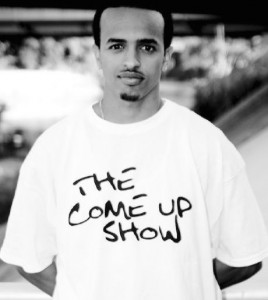Banner photo credit: Ross Howey
By datejie cheko green
On a blustery, wet Wednesday evening in London, Ontario, four astute, creative and incredibly talented guests – three of them, London natives – joined with me to bless this Remix-themed event, the first in my “Dialogues” series.
As Black and Indigenous creators, we came in good faith to take up our rightful space as knowledge workers, producers and community members. In performance and dialogue, we remixed our works and our experiences of the digital, of historic and emerging archives, and of what it means to blaze one’s own trail with dignity and integrity, against the grain of colonial legacies and imperial times that seek to disavow our worth.
We were joined by a keen and interested audience – a mix of students, staff, faculty and members of the public, who posed some tough questions about lack of community cohesion and how to build it, challenges that spoke to the crux of solidarity.
As the panelists so aptly noted, in a time that rewards perpetrators of violence against Black people, a society that condones the destruction of Indigenous women, a culture that consumes and objectifies artists… it’s a transformative act just to stay alive, commit to your good work, engage people respectfully, and express the wholeness of who you are and what you do, so that others may find affirmation in your example. These are seeds, the very lifeblood of connecting, healing and organizing.
When all was said and done, we had also shared some hopeful accounts of how digital creation and internet communications are enabling meaningful connections between us on a global scale. These have made it possible to bypass the often limiting, marginalizing, alienating and destructive aspects of the face-to-face and embodied relations that constrain our opportunities to live, work, produce, engage with society and express ourselves.
Digital technologies have enabled us, and so many like us, to take control over the means of production, go around the historic gatekeepers, and reach like-minded audiences and collaborators wherever they reside.
As Lido Pimienta testified, acquiring and applying her own artistic production tools, producing her music and now those of others, including A Tribe Called Red, has allowed her to refuse the unsafe and exploitative work that are standard and required conditions for women of colour in the music industry. Instead of giving into the industry’s insistence that she make herself into a slight, blond, childlike woman to maximize their profit potential, she is maximizing her self-love and developing her own fierce creative path, representing as a Black and Indigenous woman.
For Dr. Mark V. Campbell, digitization has made it possible to practice decolonial and collectivizing methods of archiving as he collects and catalogues Hip Hop artifacts from little-known Toronto innovators who were the cultural-artform’s forerunners in the 1980s. Once compliled, he shares the archive with its contributors, in direct contrast to the long practice of colonial archives that have served and answered to elite, capitalist and hegemonic interests. And this work has fundamentally informed his ongoing campaign to build a bricks-and-mortar space for Black youth in Toronto, Nia Centre for the Arts.
In making his transition from radio to the internet with The Come Up Show, Adulis “Chedo” Mokanan was not only able to reach a thousand times more people, he was able to find his strength and talent in research and interviewing, over DJing and playing music. While the radio show continues with Chedo’s team at the turntables, the Hip Hop world is better for his work as an internet broadcaster and columnist. There, his ability to attract and converse with deeply talented artists, in contrast to mainstream journalists’ focus on artists as commodities, has become a destination and an archive in its own right.
The evening wrapped up with a soothing dance mix as Harina took us home with a music set that perfectly closed out the Dialogue and opened up the mingling. People who had heard tell of each other through cyberspace, came to meet and know each other in real space and time, all bouyed by the artful fusion of modern African music styles that is Empyrean Productions.
As I reflect on how it all came together, Remixing the Digital Archive did permit Black & Indigenous creators to reclaim knowledge space at the heart of Western University campus. And we did so thanks to the interest and solidarity of many behind the scenes who responded to its very idea, helped spread the word, and handled set-up and documentation. To the students, staff and faculty at FIMS, some of whom I know only virtually, and others whom I met and worked with for the first time at the event, your contributions to facilitating this dialogue are greater than the sum of their parts, and are deeply appreciated.
Thanks to all who contributed, attended and supported.
In solidarity,
dcg
(Video and audio documentation of this event is forthcoming. For more info contact: datejie@solidarityconscious.org)





